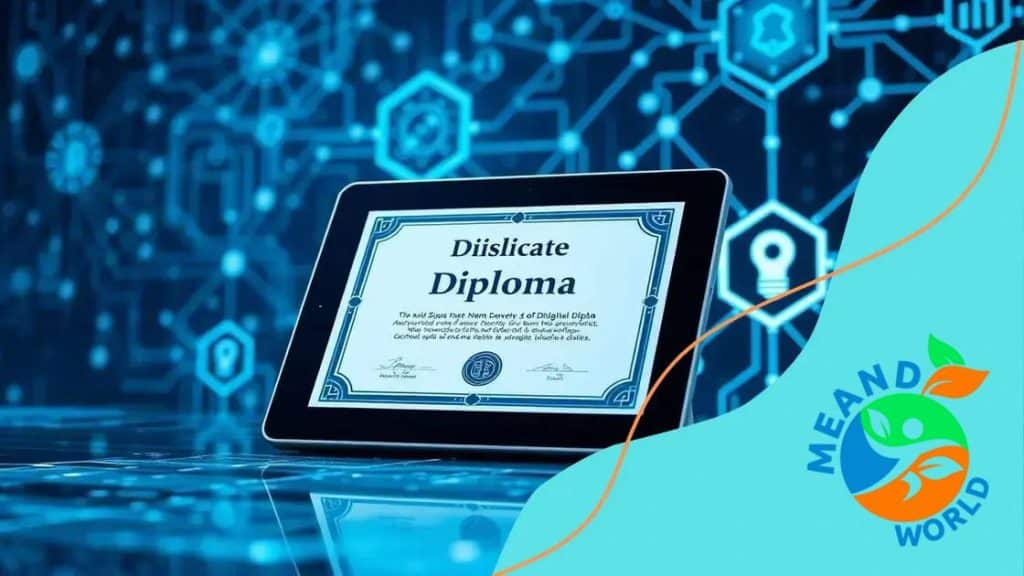How blockchain is securing academic records and credentials

Anúncios
How blockchain is securing academic records and credentials enhances verification through unalterable digital ledgers, ensuring authenticity, reducing fraud, and streamlining processes for institutions and employers.
How blockchain is securing academic records and credentials represents a significant shift in how we verify educational achievements. Have you ever wondered how your degrees could be safer from fraud? Let’s dive into this exciting development.
Anúncios
Understanding blockchain technology
Understanding blockchain technology is essential in today’s digital landscape. This technology serves as a foundation for secure and transparent transactions, fundamentally changing how we interact with data.
Anúncios
At its core, blockchain is a decentralized ledger. It allows multiple users to access the same information while ensuring that data remains unalterable. This feature is particularly vital when it comes to sensitive information like academic records.
Key Features of Blockchain
There are several characteristics that make blockchain a standout technology:
- Decentralization: Unlike traditional databases, blockchain does not rely on a central authority. This reduces the risk of data manipulation.
- Transparency: Every transaction is recorded and can be viewed by all participants. This builds trust among users.
- Security: Advanced cryptography secures data, making it highly resistant to unauthorized access.
- Immutability: Once recorded, data cannot be changed. This ensures the integrity of documents like diplomas and transcripts.
Imagine how this technology can benefit educational institutions. Registrars can securely issue degrees that are instantly verifiable by employers. This could cut down on the prevalence of fraud in the academic world. With blockchain, institutions enhance their credibility while providing added security to students.
Applications Beyond Academia
While blockchain’s impact on academic records is significant, its utility spans various sectors. For instance, industries like finance, healthcare, and supply chain management are leveraging blockchain to improve operations. The secure and transparent nature of blockchain allows for better tracking of goods and management of patient records.
As blockchain matures, more applications will emerge, providing innovative solutions to longstanding issues. Ultimately, understanding blockchain technology not only aids in appreciating its current uses but also in anticipating its future potential.
Benefits of blockchain in academic records
Benefits of blockchain in academic records are transforming how institutions manage and verify degrees and credentials. With this innovative technology, schools can enhance transparency, security, and efficiency in record-keeping.
One major advantage is the ability to prevent fraud. With traditional diplomas, it’s often easy to forge documents. However, when institutions use blockchain, every degree is stored in a secure, unalterable ledger. This makes it practically impossible to alter or fake a record. That means employers can trust the qualifications of job applicants.
Increased Transparency
Another vital benefit is transparency. Since all transactions are recorded on a public ledger, stakeholders can easily verify the authenticity of educational credentials. This transparency builds trust between students, employers, and educational institutions.
- Reduced Administrative Burden: Institutions can save time and effort by using automated verification processes, rather than manual checks.
- Real-time Updates: Changes in student records can be made instantly without delays, ensuring that all information is current.
- Global Access: Academic credentials can be easily shared across borders, facilitating international employment and collaboration.
Moreover, blockchain can streamline the application process for students. Imagine applying to universities without the hassle of sending physical documents. With a blockchain system in place, students can provide verified digital credentials instantly.
Reinforcing Trust and Security
Using blockchain enhances the overall security of educational data. Each record is securely encrypted and can only be accessed by authorized users. This is crucial for protecting sensitive information like social security numbers and academic achievements. The loss or theft of this data can have devastating effects on students and institutions alike.
Adopting blockchain technology not only benefits educational institutions but also empowers students. With secure digital credentials, students can manage their academic histories more effectively while ensuring their achievements are recognized globally.
How blockchain ensures data integrity

How blockchain ensures data integrity is central to its appeal in various sectors, including education. The technology provides a secure framework that guarantees the accuracy and authenticity of information.
Each transaction on a blockchain is linked to previous transactions, creating a chain of data that is almost impossible to alter. This chain can be thought of like a series of linked blocks, each containing a record. If someone tries to change one block, it would require altering all subsequent blocks. This makes tampering highly unlikely, reinforcing trust in the recorded information.
Mechanisms of Data Integrity
Several mechanisms contribute to maintaining high data integrity in blockchain:
- Cryptographic Hashing: Each block has a unique hash that represents its data. This hash is created through complex algorithms, ensuring that even a tiny change in the data will create a completely different hash.
- Consensus Algorithms: These algorithms ensure that all participants in the network agree on the validity of transactions. No single entity can manipulate the data.
- Decentralization: Since data is stored across multiple locations, there is no single point of failure. This decentralization makes it difficult for any malicious actor to gain control.
The implications for academic records are significant. When degrees and credentials are recorded on a blockchain, students can be sure that their achievements are securely stored and easily verifiable. This reduces the risk of diploma mills that issue fake certificates.
Real-World Examples
Several institutions are already leveraging blockchain technology to secure academic records. For instance, a university could issue digital diplomas that are automatically verifiable by employers. This not only saves time but also enhances credibility. Companies can trust that the qualifications listed by candidates are legitimate, simplifying the hiring process.
By adopting blockchain, educational institutions are taking a significant step toward modernizing their record-keeping systems. As technology continues to evolve, the focus on data integrity will only grow stronger, leading to more secure and reliable academic environments.
Challenges in implementing blockchain solutions
Challenges in implementing blockchain solutions are important to understand for institutions considering this technology. While blockchain offers many benefits, it also comes with hurdles that must be addressed.
One major challenge is the cost of implementation. Setting up a blockchain system requires investment in software, infrastructure, and training. Institutions must weigh these costs against the potential benefits. In many cases, smaller organizations may struggle to afford the initial investment, which can slow adoption.
Technical Complexity
Another challenge lies in the technical complexity of blockchain systems. Unlike traditional databases, blockchain technology requires specialized knowledge for effective management. Schools may need to hire or train personnel who understand how to maintain and operate blockchain solutions.
- Integration with Existing Systems: It can be difficult to integrate new blockchain systems with older records systems, causing potential disruptions during the transition.
- Scalability Issues: As the number of transactions increases, ensuring that the blockchain can scale effectively to handle this growth can be a significant technical hurdle.
- Regulatory Concerns: Institutions must navigate the legal landscape associated with data protection and privacy, which can vary by region.
Moreover, resistance to change can also pose a challenge. Faculty and staff may be hesitant to adopt new technologies, particularly if they are not familiar with them. This reluctance can prevent the successful implementation of blockchain solutions.
Security and Privacy Considerations
Additionally, while blockchain is known for its security, it is not immune to risks. Security breaches can still occur, especially if the implementation is not executed correctly. Institutions must ensure that their blockchain systems are designed to protect sensitive information properly.
Another critical factor is user privacy. Educational records often contain personal information. Finding a balance between sharing data for validation while protecting student privacy remains a challenge in implementing blockchain in academia.
Future of academic credentials with blockchain
The future of academic credentials with blockchain is set to revolutionize how educational achievements are verified and shared. As technology evolves, it opens new possibilities for securing and managing academic records.
With blockchain, we can expect greater accessibility and real-time verification of credentials. Students will be able to store their diplomas and transcripts digitally. This can eliminate the need for physical copies and simplifies the process of applying to jobs or further education.
Streamlined Processes
Blockchain technology can streamline the application process in significant ways. For instance, when a candidate applies for a job, they can share their verified records through a secure link. Employers can quickly validate these records without extensive background checks.
- Instant Verification: Hiring managers will no longer have to wait for institutions to respond to verification requests.
- Improved Trust: Confidence in educational qualifications will increase as academic records are securely verified through blockchain.
- Global Recognition: Blockchain can help standardize academic credentials across countries, facilitating international mobility for students and graduates.
Additionally, educational institutions can build more transparent relationships with employers. Companies will have immediate access to verified data about candidates, making the hiring process quicker and more efficient. This efficiency is attractive to both employers and job seekers.
New Learning Models
Besides credential management, blockchain may also encourage innovative learning models. For instance, micro-credentials or badges can be issued for skills acquired through short courses. These can be stacked on a blockchain to represent a broader body of knowledge.
As we look ahead, partnerships between educational institutions and blockchain companies will likely grow. These collaborations will foster the development of new solutions that improve how academic credentials are issued, managed, and recognized globally.
In conclusion, blockchain technology is set to reshape the landscape of academic credentials significantly. By offering enhanced security, transparency, and efficiency, it builds trust in the educational system. Moving forward, educational institutions can better serve students and employers alike, ensuring credentials are easily verifiable and protected against fraud. As we embrace this technology, we look forward to a future where academic achievements are securely recorded and recognized globally.
FAQ – Frequently Asked Questions about Blockchain in Academic Credentials
What are the main benefits of using blockchain for academic records?
The main benefits include enhanced security, increased transparency, improved efficiency in verification processes, and global recognition of credentials.
How does blockchain prevent fraud in academic credentials?
Blockchain creates an unalterable record of credentials that can be easily verified, making it very hard to forge diplomas or transcripts.
What challenges do institutions face when implementing blockchain?
Challenges include high implementation costs, technical complexity, integration with existing systems, and security concerns regarding personal data.
What does the future hold for academic credentials with blockchain technology?
The future looks promising as blockchain can help streamline processes, offer real-time verifications, and enable innovative learning models like micro-credentials.





